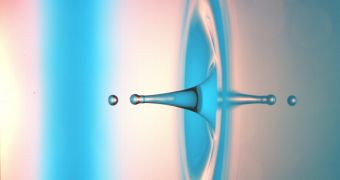Over 70 % of the adult body is made of water. Our body cannot function without water: a human will die faster of thirst than of hunger. A 68 kg person has about 40 liters of water in the body. 23-26% is found inside the cells, 7,5 % in the space between the cells and up to 4 liters in the blood. This volume must be kept constant. Food does not deliver enough moisture; doctors say we should drink two liters of water daily, since our body eliminates water through urine, sweat (we sweat even when temperature is under 0), feces and breath.
Water is never enough: you will compensate for the body's ability to eliminate water (a state called hyperhydration) only by drinking over 7.5 liters of water in 24 hours. Here are 14 reasons why you should drink a sufficient amount of water daily:
1. Dehydration (lower water amount) affects body functioning - Digestion, excretion and the constant maintenance of the body temperature cannot be ensured if water is under the normal levels in the body. The water balance is connected to the electrolyte levels (mineral salts blood ratio). The sodium level in the blood is the source which can 'tell' us the hydration level in our body. When there is too much sodium in the blood, the body retains water to dilute the sodium excess and less urine is produced.
2. Thirst - this is a sensation forming in the brain nuclei, which can be easily 'cheated'. That's why dehydration may not cause immediate thirst. You may be dehydrated without being thirsty. When you're thirsty, you're already dehydrated. Dehydration and thirst are more connected when you practice sports.
3. Diet - Dieting means eating less, and since foods can be an important source of water for our body, you must replace the water ingested through food by drinking that equal amount.
4. Temperature - Heat boosts the required amount of water, as you sweat more to cool down the body. Water consume must increase during summer. The same happens during exercising: muscular contraction releases heat, the body temperature increases, and so does sweating. An adult needs one extra liter of water for each hour of exercising.
5. Kidney - Chronic dehydration has been connected to the development of kidney calculi. This works also for chronic urinary infections. Also the kidneys work better with abundant water.
6. Skin - Aging skin loses water. Hydrated skin is smoother and healthier. Water feeds the skin and cleans the body of toxins, that's why hydrated skin looks healthy and shiny.
7. Toxins - Water is involved in all the metabolic reactions. Diets rich in proteins require higher amounts of water, because higher amounts of toxic nitrogen compounds form and they are easier to be eliminated by the organism in the presence of abundant water (because kidney and sweat glands work faster).
8. Diuresis - Water ingestion speeds up the elimination of liquids and drugs from the organism.
9. Aging - In case of elder people, the sensation of thirst decreases, especially if they are sedentary or suffer from dementia. Their kidneys lose more water and they should drink a cup of water every two hours.
10. Slimming - Water has no calories. Drink water before eating, and it will decrease the sensation of an 'empty stomach', the hunger sensation. Do not drink water after eating! This will dilute the ingested food, which will pass faster through the stomach and hunger sensation will return earlier. Also, water dilutes the digestive juices in the stomach.
11. Vomits. People may not realize that through vomiting they lose huge amounts of water and electrolytes. Diarrhea and fever (through sweat) too have the same effect and the body loses sodium and potassium, which are very important in the water balance. Up to 4 liters daily can be lost through severe vomiting or diarrhea, that's why salts must have a replacement. Isotonic drinks or alkaline solutions are recommended, too.
12. Diabetes - the only symptoms of the diabetes insipidus are the exaggerated thirst and the excessive amount of urine. It can start gradually or suddenly at any age and it is the result of a deficiency of antidiuretic hormones, which limit the production of excessive urine. A person can drink enormous amounts (4 to 30 liters) of liquid to compensate the loss produced by so much urine.
13. Coffee and tea - caffeine is a mild diuretic, speeding up the urination cycle, but at the same time, it "steals" the calcium and electrolytes (that are eliminated through urine). Coffee also increases water loss through feces, since it functions as a laxative.
14. Alcohol - you say that you're going to get hydrated with a beer. That's false: you're going to lose more water. It's not only about the diuretic effect of the beer. After a drinking bout, on average 3 glasses of water are required to rehydrate your body. Because by drinking you lose many fluids, going to bed dehydrated will make the body unable to eliminate the alcohol, and (in concentrated levels) the alcohol will induce nasty effects in time.

 14 DAY TRIAL //
14 DAY TRIAL //